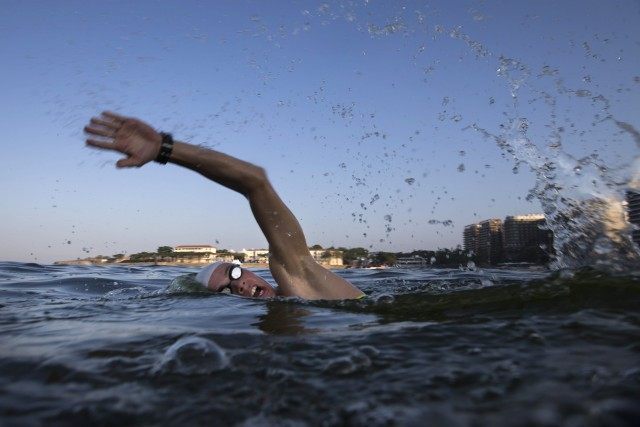Fecal matter, oil spills, garbage bags, and dead bodies pollute water-sports sites for the 2016 Olympic summer games. According to a 2014 New York Times report, Brazilian sailing legend Lars Grael encountered human corpses on four separate occasions at would-be competition sites for the Rio games.
A year later, the waters may seem clearer but they remain dangerous.
An independent AP report, released in July, claims that none of the water sites allocated for next year’s competition are safe. Rodrigo de Freitas Lake, where rowing and canoeing will take place, overflows with no less than 1.7 billion adenoviruses, 1.7 million times the amount that would be allowed in California’s waters. Ingest a few teaspoons and you’ll likely to spend an afternoon in the bathroom.
A United States team competing in the World Junior Rowing Championships became Exhibit A in Rio’s dangerous waters. Fifteen members reportedly experienced violent vomiting and diarrhea. It’s unclear but suspected that the waters caused the illness.
“It’s not the cleanest bay in the world, and I can pretty much guarantee it won’t be ready for the Olympics.” Australian sailor Jason Waterhouse told the New York Times. “It’s in the back of your mind, that’s for sure.”
Given the recent report, the World Health Organization (WHO) recommended that the International Olympic Committee (IOC) test for viruses as well as bacteria. Two days later, they backpedaled, inviting corruption allegations similar to those that plagued FIFA after it awarded World Cups Russia and Qatar.
It is hard to blame the IOC for attempting to cover up a mess they didn’t necessarily create. Selecting the location does fall on their hands but when Brazil won the honor in 2009 it promised to clean the problem it itself created.
For decades, Rio treated only 17-30% of its sewage. They dumped the rest into its picturesque bodies of water. An assortment of trash accompanies the feces, filling the once pristine beaches with condoms, toys, mattresses, and milk cartoons.
Six years later, the goal of treating 80% of the sewage seems unlikely. The water reeks, the garbage remains, and the reported $1 billion spent on cleanup efforts barely scratched the surface. The IOC passed the point where they can reward the games to a new city, and so, the show must go on.
Complicating the matter further, a new problem has emerged.
“It’s easier to say it’s poop and pee than petroleum from a state business that sponsors media, events, and games,” local activist Alexandre Anderson told USA Today. As Rio de Janiero slowly grows as an oil production hub, Anderson has set up “environmental patrols,” hoping to prevent dumping from refineries and support boats. Clearly, he has hit a nerve, ducking gunfire twice for his efforts.
The violence Anderson encountered brings to light the main issue: the widespread lawlessness, corruption, and lack of accountability plaguing the nation. In June, several businessmen associated with the state-owned oil giant Petrobas were arrested, charged with paying off officials in return for lucrative contracts. Combined with a sluggish economy and rampant gang violence, President Dilma Rousseff’s approval rating has dropped into the single digits.
For more than 1,400 athletes ready to compete in Rio’s waters less than a year from now, the distractions mount.
“My biggest fear isn’t getting sick. It’s more the performance issues affected by running into collecting garbage in the bay while sailing,” Waterhouse tells the New York Times, in reference to Australia’s Nathan Outteridge dropping from second to seventh after encountering debris in the water. “That can end a race. That’s my biggest fear.”

COMMENTS
Please let us know if you're having issues with commenting.